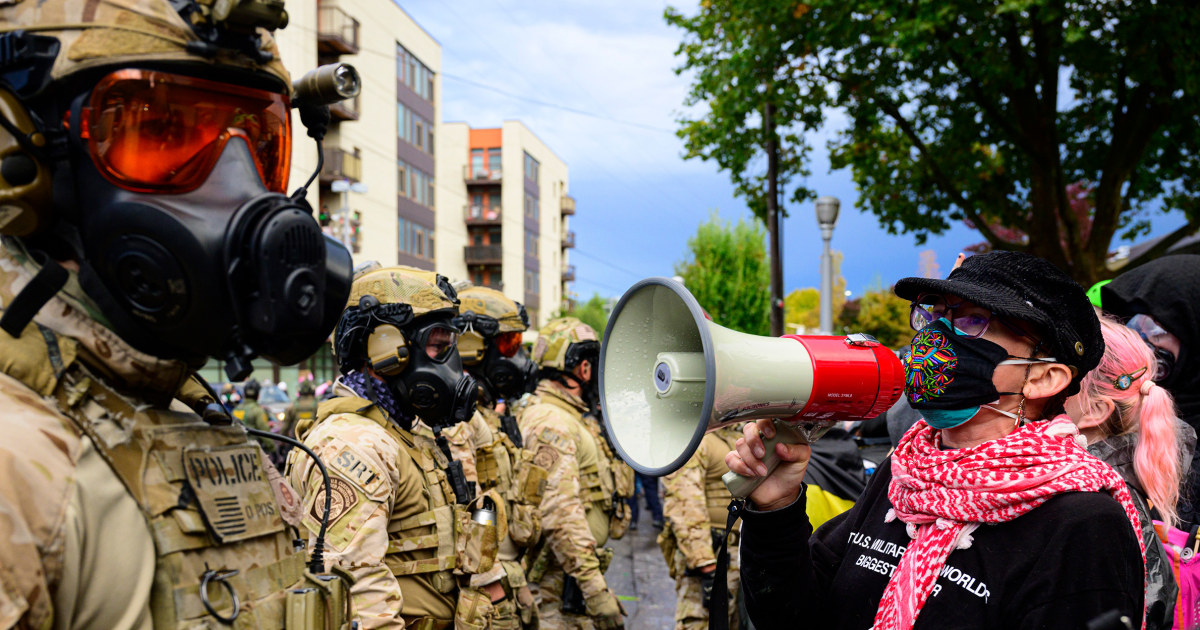A federal appeals court ruling on Monday will allow the Trump administration to send National Guard troops into Oregon against the state’s wishes, hitting pause on a lower court’s order that had barred the deployment.
“After considering the record at this preliminary stage, we conclude that it is likely that the President lawfully exercised his statutory authority,” the panel of 9th U.S. Circuit Court of Appeals judges wrote in a 2-1 ruling.
Justice Department attorneys had argued in a court filing that U.S. District Judge Karen Immergut’s ruling temporarily halting the deployment “improperly impinges on the Commander in Chief’s supervision of military operations, countermands a military directive to officers in the field, and endangers federal personnel and property.”

Immergut, a Trump nominee, said in her order that it appeared the president was acting in bad faith with exaggerated claims of violence in the city, including that it was “war ravaged” with “ICE Facilities under siege from attack by Antifa” and “crazy people” who “try to burn down buildings, including federal buildings” every night.
“The President’s determination was simply untethered to the facts,” the judge wrote.
The two appeals court judges — also Trump nominees — said the president’s position was entitled to more deference.
“Rather than reviewing the President’s determination with great deference, the district court substituted its own determination of the relevant facts and circumstances. That approach is error,” the opinion by Judges Ryan D. Nelson and Bridget S. Bade said.
“Even if the President may exaggerate the extent of the problem on social media, this does not change that other facts provide a colorable basis to support the statutory requirements,” they wrote.
The dissenting judge, Susan P. Graber, ripped her colleagues’ ruling.
“Given Portland protesters’ well-known penchant for wearing chicken suits, inflatable frog costumes, or nothing at all when expressing their disagreement with the methods employed by ICE, observers may be tempted to view the majority’s ruling, which accepts the government’s characterization of Portland as a war zone, as merely absurd,” Graber wrote.
The ruling, she wrote, “is not merely absurd. It erodes core constitutional principles including sovereign States’ control over their States’ militias and the people’s First Amendment rights to assemble and to object to the government’s policies and actions.”
Immergut, the lower court judge, had found that while there had been some protests that turned violent back in June, federal and state law enforcement now seem to have the situation well in hand.
“On September 26, the eve of the President’s directive, law enforcement ‘observed approximately 8-15 people at any given time out front of ICE. Mostly sitting in lawn chairs and walking around. Energy was low, minimal activity,’” Immergut’s order noted.
During a hearing before the 9th Circuit earlier this month, a lawyer for the Justice Department argued the mobilization was necessary. He said federal officials were repeatedly forced to call in backup to combat chaos outside the immigration processing facility in the city, and that protesters had blocked cars, spit on authorities and in one instance lit a fire outside the facility.
“These are violent people,” DOJ attorney Eric McArthur told the panel.
The Trump-appointed judges indicated during the hearing that they believed that the state and the lower court judge were not showing enough deference to the president’s decision making.
“It just seems a little counterintuitive to me that the City of Portland can come in and say no, you need to do it differently,” Judge Ryan D. Nelson, one of the Trump nominees, said.
The 9th Circuit blocked a similar restraining order this year involving National Guard troops in Los Angeles and held then that the president’s judgment about whether troops are needed should get “a great level of deference.”
Immergut referenced the California decision in her ruling, but added that “’a great level of deference’ is not equivalent to ignoring the facts on the ground.”
The appeals court ruling only gives the green light to Oregon National Guard troops being deployed. The judge issued a separate restraining order barring National Guard troops from other states being sent into Portland, which the government has yet to appeal.
The majority decision said that order would meet the same fate because Immergut used the same legal reasoning.
At the hearing last week, McArthur said the administration would ask the judge to reconsider that order if the appeals court ruled in its favor on the Oregon troops.
A federal judge in Chicago last week issued a temporary restraining order barring National Guard troops from being deployed there. The administration is appealing that order as well.

